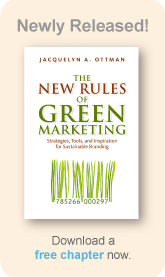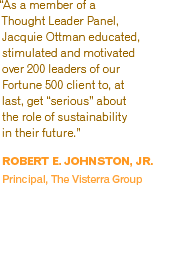Know Thy Target
By Jacquelyn A. Ottman
In Business, November 2003
How do you define your target consumer? Demographically - by age, locale or sex? Or psychographically, i.e., by lifestyle orientation? Why do your customers really buy your product? Are they genuinely interested in the environmental benefits your product offers or are they more interested in saving money or preserving their health? Are they more motivated by global issues such as climate change and ozone layer depletion or such local ones as air and water pollution or litter? How can you efficiently find more customers just like them?
For green marketers, answering such questions may be tough. The market for green goods appears to be a narrow niche, but the complexity of the issues and the many ways to solve them suggests that it is highly segmented.
In a market that's still quite "green," sophisticated mailing lists and databases do not yet exist like those in more evolved markets. A tiny bit of rather unsatisfactory research has attempted to segment the market; beyond that, we can speculate about other ways to divide up the green consumer pie based on specific areas of environmental interest and lifestyle orientation.
HOW DEEP IS YOUR CUSTOMER'S GREEN INTEREST?
Roper Starch Worldwide has segmented the green consumer market into several 'shades' of green. They range from a 15 percent core of educated, upscale individuals who say they are willing to pay a premium or forego certain conveniences to ensure a cleaner environment, to 37 percent of the public who are doggedly non-environmentalist, characterized more by indifference than by anti-environmentalist leanings.
Environmental behavior varies significantly between these shades; the deepest are the True-Blue Greens and the Greenback Greens, which Roper identifies as the active environmentalists. In the middle are the 'Sprouts,' characterized as the swing segment, followed by the non-active environmentalists, namely the 'Grousers' and finally the 'Basic Browns' - a considerable departure from the True Blues. The deeper the 'shade' of green, the greater the willingness to make green purchasing decisions.
WHAT IS YOUR CONSUMER'S INTEREST - EXACTLY?
Deep green consumers can be further characterized by the type of environmental issue that concerns them. We at J. Ottman Consulting have detected what appears to be three distinct groups closely mirroring various environmental issues and the respective environmental groups and media vehicles that target them. They include: "Planet Passionates," "Health Fanatics", and "Animal Lovers.
Planet Passionates want to protect wildlife and keep the environment pristine for recreational purposes. They focus on issues relating to land, air, and water. They recycle bottles and cans, avoid over-packaged products, clean up bays and rivers, and boycott tropical hardwoods.
As implied by their name, Health Fanatics focus on the health consequences of environmental problems. They worry about getting cancer from too much exposure to the sun, genetic defects from radiation and toxic waste, and the long-term impact on their children's health of pesticides on fruit. Health Fanatics frequent natural-food stores, buy bottled water, and eat organic foods.
Animal Lovers protect animal rights. They boycott tuna and fur, and among their favorite causes are manatees and spotted owls. Animal Lovers check to see if products are "cruelty-free." They are likely to be vegetarians.
HOW GREEN IS MY CUSTOMER'S LIFESTYLE?
Regardless of environmental or health concerns that motivate them, keep in mind that greens will also divide up on how they choose to integrate green into their own personal brand of 21st century lifestyle. So green consumers can also range from the more low tech/"high touch" segment of Birkenstock-clad, yoga-practicing, fair traders with a fondness for hemp, beans and granola who may frequent Whole Foods, the updated version of the local health food store of yesteryear, to the more design-oriented, technologically savvy creative types interested in hybrid cars, wind-up trendy radios, and fashions engineered from used soda bottles.
FIND THEM ON THE INTERNET
Every green consumer segment has distinctive tastes, buying habits and preferences. They have different media habits, too, all of which must be addressed to assure the most relevant communications and targetted message delivery
The segmented nature of green along with its current niche appeal, suggests that the Internet may prove quite useful in finding one's target cheaply and quickly.
For products with narrow appeal, the Internet can help growing businesses cast a wide geographic net. Various sites such as Gaiam.com, GreenHome.com and Environmental Home Center.com can help target various types of consumers attempting to integrate green buying into their lifestyles.
The more actively engaged greens such as Roper's True Blue Greens and our own "Animal Lovers" might be found at activist sites such as The Center for A New American Dream (www.newdream.org), Co-op America's Green Pages Online (www.greenpages.com), Igive.com, and Greenculture.com which encourage consumers to buy differently in support of various social and environmental causes.
All greens might be found shopping at the myriad sites which specialize in green products of every stripe, from health and beauty aids, and pet foods, to energy efficient lighting products such as dimmable fluorescent torchieres (yes, they do exist!) not found in conventional lighting stores.
Still other sites, such as The Green Guide (www.greenguide.com), EarthSystems.org, The American Council for an Energy Efficient Economy (www.aceee.org), and ecoworld.com, offer green networking, bringing greens of all stripes and information together.
Green Consumer Sites
Online store for green consumer products, including articles to help you go green, an online magazine, and a rigorous product approval policy about the environmentally responsible products they sell.
Co-op America's Green Pages Online
Co-op America's Green Pages Onlineª is a directory of green businesses with demonstrated commitments to social and environmental responsibility. Site features green companies and their products (available for purchase through the website); also includes a searchable database.
Anytime you buy merchandise from one of the popular retailers accessible through this website, they will donate up to 5% of each purchase to progressive causes.
GAIAM "Simple Choices Make a Difference"
Founded in Boulder, Colorado in 1988, Gaiam is a provider of information, goods and services to customers who value the environment, a sustainable economy, healthy lifestyles, alternative healthcare and personal development. Shop-learn-travel. Weekly product spotlight hotbox.
Center for a New American Dream
The Center for a New American Dream helps Americans consume responsibly to protect the environment, enhance quality of life and promote social justice. Site contains an action network, campaigns and programs information, a community action guide, publications available for download, as well as a section for kids - including a site directed at youth consumers (www.ibuydifferent.org) - which gives young people the scoop on how their buying affects the environment and provides opportunities to take action.
ACEEE - American Council for an Energy Efficient Economy
The American Council for an Energy-Efficient Economy is a nonprofit organization dedicated to advancing energy efficiency as a means of promoting both economic prosperity and environmental protection. Consumer Resources include: "What you can do to save money: checklist for action" , "Consumer Guide to Home Energy Savings" "The most energy efficient appliances," and the "Green Car Book" - which ranks cars and trucks based on environmental soundness.
HUGE site with just about everything (product wise). Lots of links.
Online store for green products - Shop, top sellers, library. Lots of discounts available. Earth Systems.org http://earthsystems.org Earthsystems.org is a non-profit organization expressly dedicated to the advancement of environmental information and education to the world community. They develop, compile, categorize, and deliver environmental education and information resources using leading electronic technologies.
Up to 27% of each purchase made at this online store goes to your favorite worthy cause. Your shopping at hundreds of online stores helps a cause close to your heart with each purchase, free and private.
Green Culture - "Eco-Friendly Products for an Enlightened Planet"
The Green Culture sells products that promote personal and social causes. From fashion and furniture to eco-sound products they promote programs and services that benefit the environment and the user.
The source for green building materials - high quality choices with the added benefit of being healthy and resource-efficient. Their environmental building supplies include non-toxic paint, natural carpets, sustainable wood products, energy-efficient insulation and people-friendly cleaning supplies.
The Green Guide is a consumer source for practical everyday actions benefiting environmental and personal health. As an environmental lifestyle newsletter and website, The Green Guide provides an intersection between mainstream consumer service (women's, health, parenting, and shelter) and environmental advocacy publications.
Care2 includes free email, as well as shopping at the Eco-Superstore, Healthy tips, eco news, petitions and alerts. A meeting place for 2.22 million members where your free clicks generate donations, and free membership for many more features.
An information resource on nature and clean technology. Showcases providers of earth-friendly products and services who seek an eco-conscious audience of consumers and green business people.
Learn more about products that are eco-labeled compared to those that are conventionally farmed or produced, keep track of labels recently added, compare labels quickly with a shorthand report card and print easily to use while shopping, and sign up to register for specific news updates.
Research for article and list of green consumer sites prepared by Lauren Gropper, Pratt Institute Graduate Center for Planning and the Environment



 ShareThis
ShareThis
Jacquelyn Ottman is president of J. Ottman Consulting, Inc., a New York-based marketing consulting firm that specializes in helping businesses derive competitive advantage from eco-innovation and green marketing. She is the author of Green Marketing: Opportunity for Innovation, 2nd edition.
Contact Us to learn more about J. Ottman's green marketing services.
Follow Jacquie on Twitter
Read Jacquie Ottman's Green Marketing Blog
Copyright© 2008 by J. Ottman Consulting, Inc.


